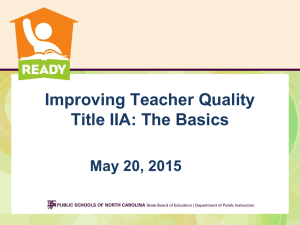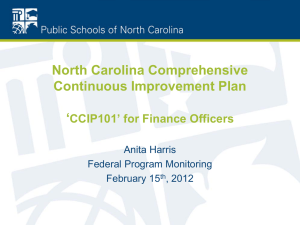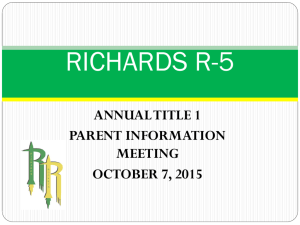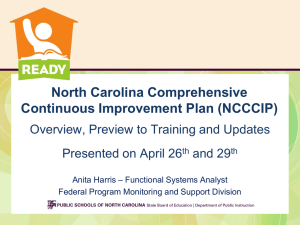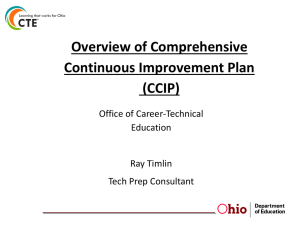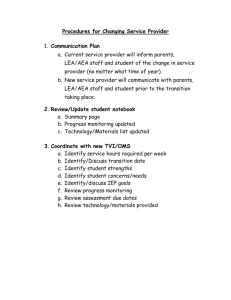Improving Teacher Quality Title IIA: The Basics July 15, 2015
advertisement
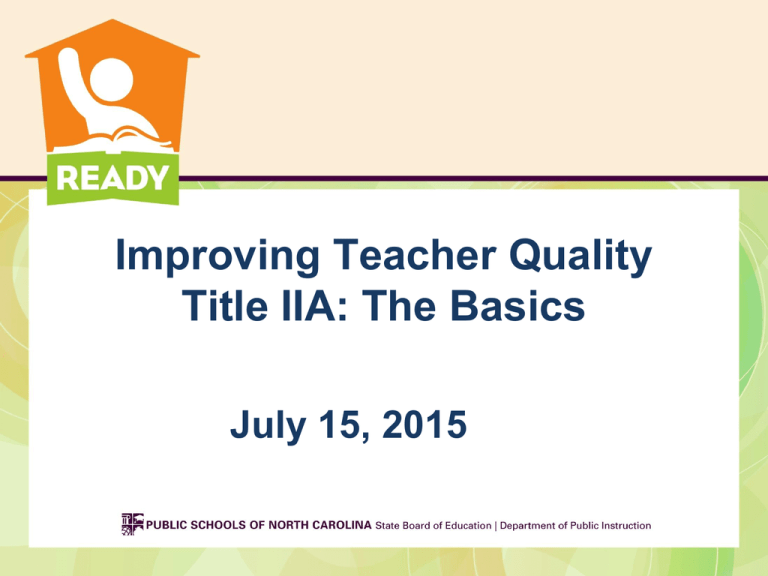
Improving Teacher Quality Title IIA: The Basics July 15, 2015 Federal Program Monitoring and Support Division Elaine Ellington Title II, Part A Program Administrator North Carolina Department of Public Instruction elaine.ellington@dpi.nc.gov 919-807-3894 Overview • History of Title II Improving Teacher Quality • Purpose of Title II, Part A • Title II Requirements • Allowable uses of Title II, Part A Funding • Consolidated Application in CCIP • Equity Plan • Non Public School Participation History of Title IIA Improving Teacher Quality • Authorized Through the No Child Left Behind Act, 2001 • Restructured the former Eisenhower Professional Development Program and Class Size Reduction • Increased Flexibility With Increased Accountability • Viewed in Context with Title I-Improving the Academic Achievement of the Disadvantage and Title IX-General Provisions Title II Part A Improving Teacher Quality Purpose To increase student academic achievement by: • Improving teacher quality • Increasing the number of highly qualified teachers in the classroom Purpose of Title II Funding Highly Qualified Teachers • Holds full state certification in the area being taught • Holds a minimum of a bachelor’s degree • Demonstrates subject-matter mastery Purpose of Title II, Part A Funding • • • • • • • • • HQ Core Content Academic Areas: Elementary Social Science Mathematics Special Education English/Language Arts Science Arts-Visual Arts, Music Foreign Language ESL Title II LEA Use of Funds Requirements To assist schools in effectively recruiting and retaining highly qualified teachers, including specialists in core academic subjects, principals, and pupil services personnel except that funds made available under this paragraph may be used for pupil services personnel only when the LEA has made progress with their AMOs. Title II LEA Use of Funds Requirements Developing and implementing initiatives to assist in recruiting highly qualified teachers (particularly initiatives that have proven effective in retaining highly qualified teachers), and hiring highly qualified teachers, who will be assigned teaching positions within their fields. Title II LEA Use of Funds Requirements Providing professional development activities-(A) that improve the knowledge of teachers and principals and, in appropriate cases, paraprofessionals, concerning their specific content areas. Title II LEA Use of Funds Requirements Developing and implementing initiatives to promote retention of highly qualified teachers and principals, particularly within elementary schools and secondary schools with a high percentage of low-achieving students. Title II LEA Use of Funds Requirements Hiring highly qualified teachers, including teachers who become highly qualified through State and local alternative routes to certification, and special education teachers, in order to reduce class size, particularly in the early grades. Title II LEA Use of Funds Requirements Carrying out teacher advancement initiatives that promote professional growth and emphasize multiple career paths (such as paths to becoming a career teacher, mentor teacher, or exemplary teacher) and pay differentiation. Allowable Uses of Funding Highly Qualified Teachers •Praxis Test Reimbursement •Coursework Reimbursement Allowable Uses of Funding Recruitment and Retention •Recruitment and Retention Bonuses •Various Recruitment Materials •Beginning Teacher Support/Mentors Allowable Uses of Funding Professional Development •Professional Development (PD) workshops/conferences •Personnel providing PD for teachers/principal •Materials used in PD activities not for student use Allowable Uses of Funding Salaries • Class Size Reduction Teachers(only if HQT% is 98% or ≥) • Substitutes for Class Size Reduction Teachers (Due to Regular Absence from the Classroom) •Substitutes for Teachers Absent Due to PD •Lead Teachers and Specialists Non Allowable Uses of Funding •Salaries for Paraprofessionals(but may pay for classes, testing, courses toward full teaching licensure) •Teachers providing remediation •General substitute teachers •Purchase of IPADs for Observations Consolidated Application Process for New Title ll-A Directors What is the CCIP? • North Carolina’s Comprehensive, Continuous Improvement Plan – A Web-based tool for electronic submission, review and approval of Entitlement and Competitive funding applications – One view for NCDPI and LEA/Charter – Two Components • Planning Tool • Funding Application North Carolina CCIP Consolidated Applications Federal Program Entitlement and Competitive Grants • Title IA Grant Program • Title IIA Improving Teacher Quality Grant Program • School Improvement Grants 1003(a) • Rural Education Achievement Programs (SRSA and RLIS) • Migrant Education Program • Neglected and Delinquent • McKinney Vento Homeless Program • 21st Community Learning Centers • After-School Quality Improvement Online with CCIP • Go to http://ccip.schools.nc.gov, click on ‘NCCCIP Sign In’ What Do I Need to Get Started? • You must have a valid NCID and an account/role in CCIP http://www.ncpublicschools.org/ncid/ • Once NCID is acquired, go to http://ccip.schools.nc.gov, click on ‘NCCCIP Sign In’ • LEAs/Charters already using CCIP contact the local user administrator for role access Consolidated Application Planning Tool Needs Assessment •Personnel and Licensure Reports-HQT% •Student achievement results •Class-size analysis •Teacher attrition/retirement projections •Hard-to-fill positions •Staff Development Surveys Consolidated Application Planning Tool Needs Assessment •Highly Qualified Teacher Data •School Activity Report (SAR Data) •Teacher Certification Licensure Crosswalk Consolidated Application Planning Tool Goals •Description •Performance Measures •Fiscal Resource •Strategies •Component Relationship Improving Teacher Quality Component Required Items-(Select at least one) • Alignment with State Standards •Coordination with Other Programs •Alignment to Professional Needs • Integration of Technology •Highly Qualified Staff Title II, Part A CCIP Funding Application Title II Sections Budget First enter budget into the NC Budget and Amendment System (BAAS). Budget from BAAS then entered into the CCIP Budget page. Funding Application Title IIA Section Grant Details •LEA Plan Development •Consultation Methods •Highly Qualified Teacher Status Title II, Part A, CCIP Funding Application Grant Details •Highly Qualified Teacher Plan •Equitable Distribution of Teachers •Professional Development for Teachers and Principals Title II, Part A CCIP Funding Application Grant Details •Teacher Evaluation Plan •Principal Evaluation Plan •Allowed Activities Once in library, click + to expand Title IIA and 2014-2015 to access menu of documents Consolidated Application Title IIA Related Documents Required /Optional Documents • Title IIA Assurance • 2014-2015 Annual Performance Report • Equity Plan • Debarment Certification Form • Non Public School Participation • PRC 103 Budget Form (SOPs Only) Title II, Part A Equity Plan PL 107-110 (No Child Left Behind) requires that states and schools systems ensure that lowwealth, minority, learning disabled and/or English language learners are taught by experienced and Highly Qualified teachers to the same extent as are students who do not fall into these categories… Title II, Part A Equity Plan •Identify any inequities in assignment of unqualified and/or inexperienced teachers to minority, learning disabled, lowwealth, or English language learner. •Describe specific strategies to address the inequities on the equity plan, including a timeline. •LEA has evaluated its Equity Plan and makes adjustments based on the impact of the evaluation. Non-Public School Participation • LEA personnel must consult with appropriate private school officials in a timely manner • Private school teachers must have opportunity to participate in Title II Part A professional development activities equivalent to the opportunity provided to public school teachers How is Title ll-A Monitored? • Cross-Program Consolidated Monitoring (CPCM) – Annually based on a risk assessment – On-site reviews – Desk reviews (pilot in 2013-14) • Program Quality Reviews (PQRs) – On-site as needed – On-site as requested • Fiscal Reviews – Annually based on CPCM schedule and other risk assessment factors Consolidated Application Deadline: June 30, 2015 Extension Requests: Donna Brown donna.brown@dpi.nc.gov Brandon Patterson brandon.patterson@dpi.nc.gov Title II, Part A Improving Teacher Quality: The Basics Questions? Title ll-A Resources • Title ll-A Web Page http://www.ncpublicschools.org/programmonitoring/titleIIA/ • Title ll-A Guidance http://www2.ed.gov/policy/elsec/leg/esea02/pg20.html Contact Information Elaine Ellingtonelaine.ellington@dpi.nc.gov 919-807-3894
